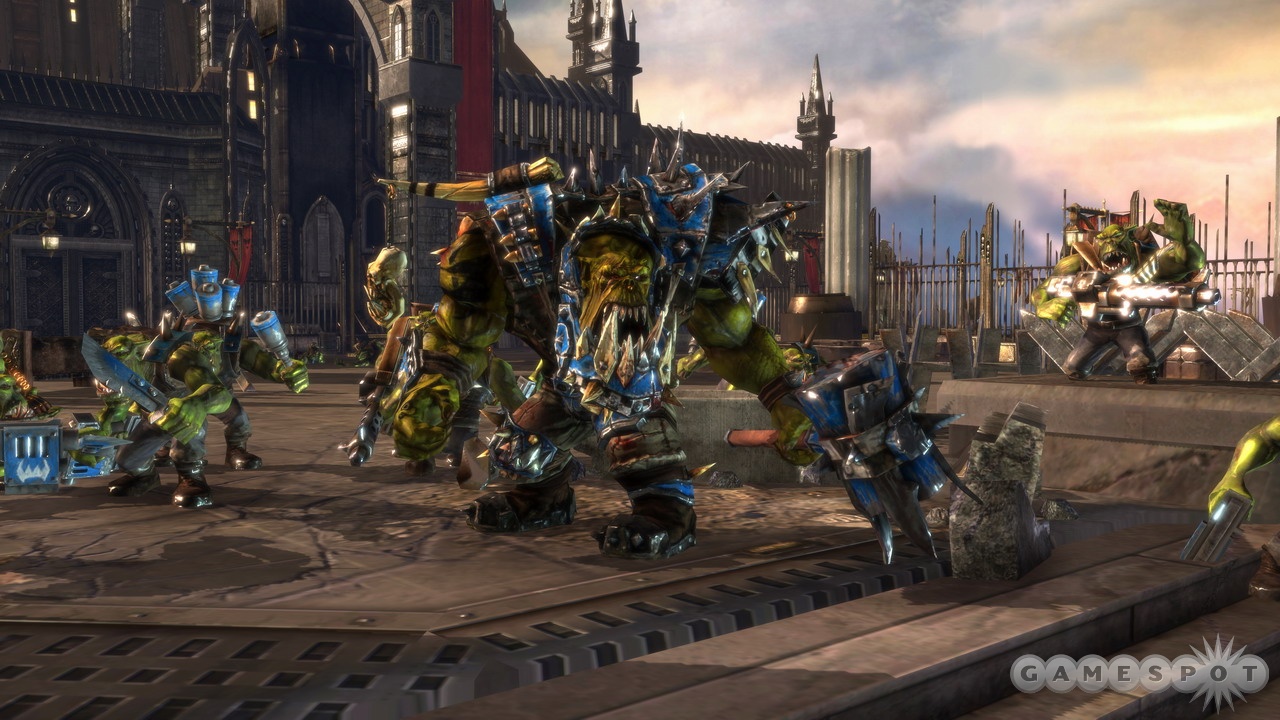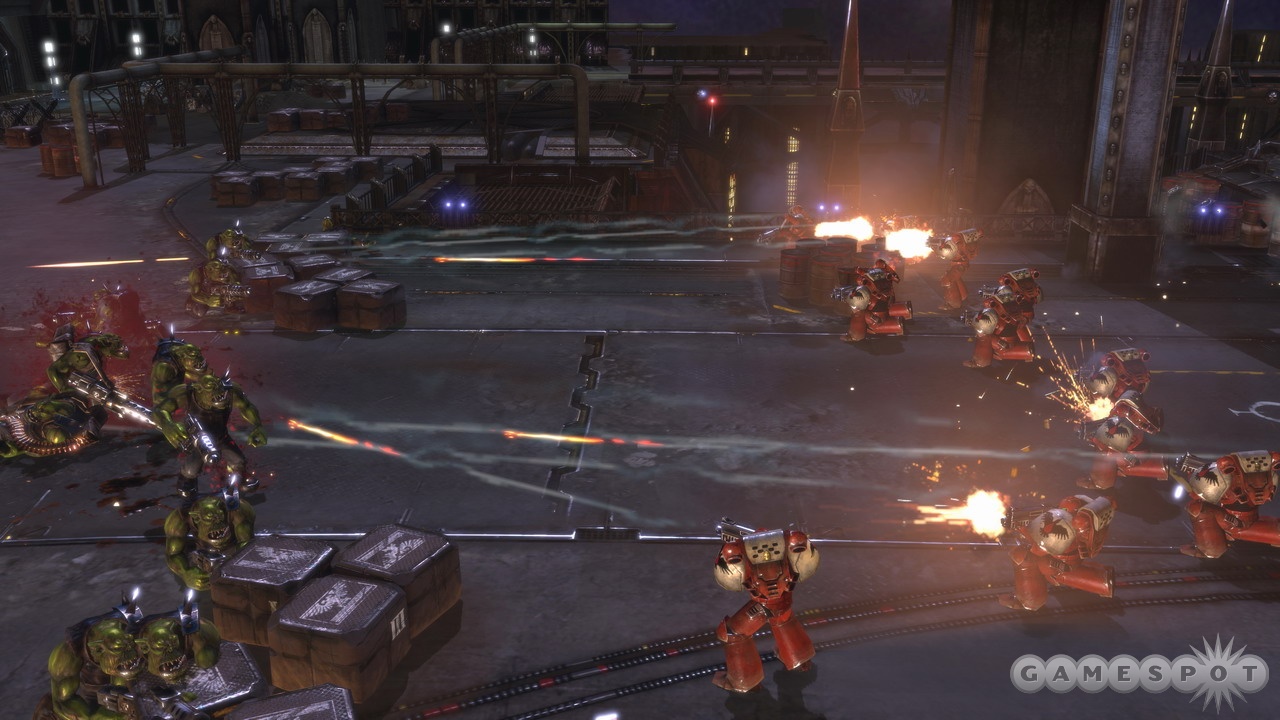E3 2008: Warhammer 40,000: Dawn of War II Updated Impressions - Ground Control and Gameplay in Motion
We take an updated look at this impressive strategy sequel at E3 2008.
The annual E3 event is the time and place to get advance looks at exciting upcoming games, and from what we've seen today, there's clearly at least one game that strategy game fans should get excited about. The development team at Relic Entertainment is working to make the impressive Dawn of War II from Relic Entertainment an even more-explosive, more-violent, and more-over-the-top real-time strategy game than the original.
The apparent focus of the Dawn of War II team's efforts so far is the single-player campaign, which will put you in control of a small number of Space Marine squads, each captained by a "sergeant" character--essentially, exceptionally powerful "hero" units, whose names, personalities, and abilities will become second nature to you as you carefully follow their progress throughout the campaign. This is because these squads will basically be your entire army throughout the campaign--there won't be any harvesting of resources to build another barracks to churn out more grunts like in a traditional real-time strategy game. You also won't be led around by the nose from preset mission to preset mission as in other, more-linear strategy campaigns. Instead, you'll travel throughout the universe in your battle cruiser with your squads, rescuing the various worlds that have been invaded by aliens by accepting various missions that appear on each planet. Your primary objectives will be either to defend a specific area from an incoming invading force, or to assassinate the commander of a hostile army that has already captured the zone.

Interestingly, the campaign will have an open-ended structure that won't require you to successfully finish every single mission before you get a chance to watch the closing credits. Instead, you'll be able to head to any distressed planet at any time and take any outstanding rescue missions--each will have a briefing with the details of your objectives, as well as a list of the experience and item rewards you'll receive at the end, which will probably influence some players' decisions on which missions to go on next. According to lead designer Jonny Ebbert, it will be possible to fail to complete the majority of missions in the campaign and still complete the campaign--like in a real war, you can't always win every battle. Nor will you need to complete every objective--most missions will have various side quests that you can choose to complete or skip. Often, these side quests will yield extremely powerful rewards, such as capturing control of a territory marker or aquiring exceptionally powerful weapons or armor that you can use to equip your units. Unlike in the original game, where control points were small flags planted in the ground, in Dawn of War II, they'll appear in the gameworld as huge imperial shrines or communications towers that, when captured, grant persistent morale bonuses to your units and may provide other benefits in-game as well. For instance, a captured imperial shrine can be used to restore the health of injured troops or as a site to commission reinforcements--replacements for any of the fallen foot soldiers that follow your sergeants.
Your sergeants themselves may also fall in battle, but they can be revived by surviving units as long as you have someone left who can walk. They'll also gain improved strength and survivability as you pick up dozens of different items and weapons that they can equip, including miscellaneous items in an "accessories" slot that can contain anything from combat bonuses that make your assault marine hero Avitus an exceptionally deadly sniper, to frag grenades that can blast away cover (and any enemies cowering behind said cover), to an orbital strike item that calls in fire from the sky when you need heavy-duty artillery. Your sergeants will start the game with standard-issue equipment and very few slots to carry it in, though over time they'll recover better items and unlock more slots to carry them in.
In addition, your sergeants will gain experience levels--this lets you develop them further, since you'll gain a single point at each level to invest in one of four key statistics: health, ranged attacks, melee attacks, and "energy," which is used to trigger each unit's special powers. Each of these four attributes has several higher-level powers embedded along the advancement path that can be unlocked with enough invested points. The melee powerhouse force commander Thaddeus, for instance, may eventually unlock a "taunt" power that draws the ire of nearby enemy units if you spend enough points in his health attribute. In addition, each sergeant will have a unique set of these special powers that will unlock with different investments of level points. Though you'll gain a substantial number of experience points throughout the campaign, you won't be able to gain enough levels to max out all four attributes or unlock all powers for all sergeants. So you'll need to choose wisely, though the development team at Relic hopes that this character development system, along with the open-ended campaign structure, will encourage you to replay the game once or twice.
During our time with the game, we watched a demonstration level in motion in actual play (as opposed to the tightly scripted demonstration version we saw some months ago). The demo level took place in a densely wooded jungle environment, which is new to the Dawn of War series, and showed the sequel's new weather system in the form of a continuous downpour. Our squads of Space Marines headed into battle against an entrenched army of orks who were spread out through the jungle, in many cases behind cover or garrisoned in the occasional guard tower.
Throughout the demonstration we saw several instances where judicious use of cover and careful squad management made all the difference in battle. For instance, at the outset, the squads entered the ork installation from the south, where an ork "shoota" unit with a powerful minigun defended the perimeter from a tower building that afforded it excellent defense. Because a frontal assault would have meant certain death, we used the scout marine squad's high-powered sniper shot ability to pick him off, then scrambled in our other troops to sweep up the rest of the perimeter guards. At another point, we hid ourselves behind a high wall that the orks could not see past, setting up an ambush by using our flying squad's "squad jump" ability to leap over the wall in a single bound, knocking most orks off their feet while our gunners hurried into a nearby tower to entrench themselves and rain down fire from above.
Pulling off daring feats like these won't always be easy, since Relic is taking special care to try to make enemies smart enough to seek cover themselves and since all cover in the game can be destroyed by explosive blasts, such as from grenades. In addition, to keep players on their toes and give them a different, challenging experience, the assassination missions will often end in spectacular boss fights against exceptionally powerful units with abilities that attack and damage all units in a specific area, such as the ork warboss we saw in motion today (which had the ability to set explosive charges in a row along the ground and to create a localized shock wave around itself to send our soldiers flying).

Though the dynamic of destructible cover adds a whole new dimension to the game, Relic's fans have apparently been most vocal about the game's multiplayer, which, though not discussed in great detail at E3, will incorporate support for Games for Windows Live, as we revealed in our recent exclusive interview. Relic representatives explained that Microsoft's service offers the features that the team was looking for in terms of reliability, ease of use, and quick-matching to join up with and stay online with friends. That Games for Windows Live also supports achievements doesn't hurt either--the game will definitely feature those as well.
Dawn of War II clearly has a lot to offer, including a fresh, new approach to an open-ended, role-playing-like campaign and its destructible cover dynamic. Stay tuned to GameSpot for more coverage of this promising strategy sequel.
Got a news tip or want to contact us directly? Email news@gamespot.com
Join the conversation